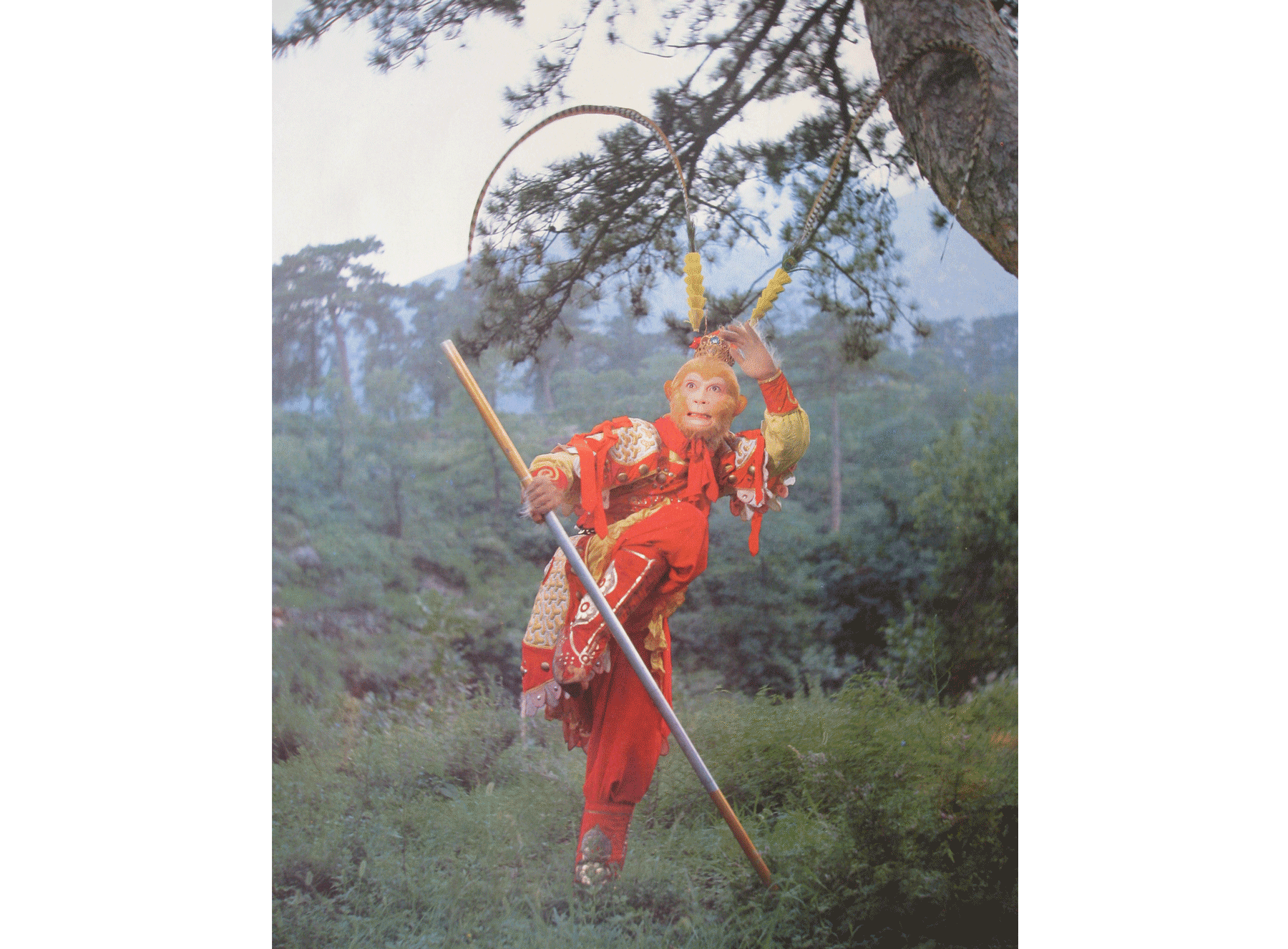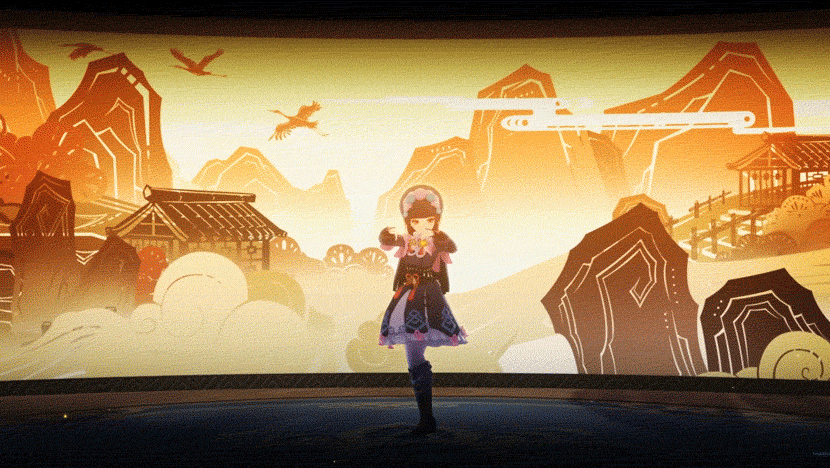
In Black Myth: Wukong, China Sees a Game That Could Change Everything
Snow crunches underfoot, shadows stretch across ancient temples, and braziers cast eerie light on towering statues. As The Destined One, a mystical warrior on a quest to reclaim magical relics, you journey through giant mountains, mythical creatures, and epic battles.
Each step, weapon, and boss fight reveals a realm where myth and history collide — all set in ancient China and steeped in its folklore.
This is the world of Black Myth: Wukong, China’s first big-budget, AAA video game that’s taken the gaming industry by storm. In its global debut on Tuesday, the game drew over 2.2 million concurrent players on Steam, surpassing the peaks of Cyberpunk 2077 and Elden Ring, and currently ranks just above Palworld and Counter-Strike 2.
Zhu Jiaqi, a cultural heritage major who tested the game in June, describes it as “a visual and auditory spectacle akin to a cinematic experience.” The 19-year-old Zhu tells Sixth Tone: “Wukong is a cherished memory from childhood, and this game brings those fantasies to life,” echoing the sentiment of many others her age.
Drawing inspiration from the iconic 16th-century Chinese novel “Journey to the West,” the game follows Sun Wukong, the legendary Monkey King, on a quest to reclaim six magical relics. Players navigate richly detailed environments — from dense forests to snow-covered mountains — battling mythical creatures and uncovering ancient secrets.

While mobile games have long dominated China’s billion-dollar gaming market, Black Myth marks a departure as a big-budget title designed for PCs and consoles. Four years in the making, the game has been highly anticipated since the release of its demo in 2020, which captivated audiences both in China and abroad.
Chinese commentators in particular were thrilled to see a classic Chinese folk tale resonating on a global scale. Now, with its full release, Black Myth could prove a turning point, paving the way for more high-profile Chinese games in the global market — its success may determine whether this genre can thrive beyond mobile platforms.
For Game Science, the company behind Black Myth: Wukong, the stakes are even higher. The firm has been embroiled in controversy for years, facing backlash over offensive comments made on social media, particularly those about women, and the absence of female characters in the game.
These issues culminated in the Weibo hashtag “Black Myth: Wukong insults women,” which has garnered over 18 million views in the two days since the game’s release, putting the company under intense scrutiny.
As the controversy swirls, the financial stakes for Black Myth: Wukong remain high. The game’s estimated development and promotion costs have exceeded $100 million, with versions priced between 268 yuan ($38) and 1,998 yuan ($280).
And with major investors like domestic tech giant Tencent — the world’s largest video game vendor — backing the project, the post-launch performance of Black Myth is crucial to Game Science’s future.

New frontier
While domestic media have showered Black Myth with praise, with many awarding it a perfect score, international reviews have been more measured.
On the review aggregator Metacritic, the game has garnered a score of 81 out of 100, indicating “generally favorable” reviews from both critics and users, with many commending its visual brilliance and production quality.
Spain’s GamersRD called the game’s artistic concept and graphics “breathtaking,” while GamingBolt highlighted its “unforgettable boss fights.”
However, not all feedback has been glowing. Some reviewers have pointed out bugs, a complex map that frustrates navigation, and a storyline that may leave those unfamiliar with the source material feeling lost.
On Tuesday, Li Dianfeng, a senior game researcher at Peking University, dived into Black Myth for three hours. In his review, Li praised the game’s ability to represent the world of “Journey to the West” in “extraordinary ways,” surpassing contemporary art forms like films, TV shows, and novels.
“The story of ‘Journey to the West’ is historical, multidimensional, and a timeless classic,” Li tells Sixth Tone. “Video games offer a comprehensive interpretation using top-tier media technology.”
Beyond its gameplay, Black Myth: Wukong taps into the growing guochao or “China chic” trend — a cultural movement that emphasizes Chinese heritage and aesthetics in modern products.

But unlike other popular guochao titles such as Genshin Impact and In the Deep of Peach Blossom Village, which focus more on exploration and life simulations, Black Myth takes a different approach. Some reviewers have likened it to a soulslike game — a genre inspired by the Dark Souls series known for its high difficulty, intricate combat systems, and deep, often obscure narratives.
According to Li, the game sets new standards in technological advancement and narrative depth for games made in China, while also attempting to carve out a place in the global market. Developed using the Epic Games-developed Unreal Engine 5, it showcases high graphic fidelity and advanced gameplay mechanics.
“This technological leap not only offers players a visually stunning experience but also raises the bar for other developers, pushing the industry toward higher technical proficiency,” says Li.
However, he also cautions that it still faces significant challenges. While games like Genshin Impact have already made a substantial impact on the global market, the hype around Black Myth has saddled it with higher expectations, as gamers hope for more than just commercial success.
“The challenge lies in making ‘Journey to the West’s’ deeply rooted cultural context accessible to a global audience,” Li explains.

According to Li, the game should refine or purify certain cultural symbols from a local perspective to attract more players interested in Chinese-themed storylines. “This approach could show the capability of Chinese creators to tell their own stories, and it might inspire developers in other countries to create games that reflect their unique cultures, rather than simply replicating Western successes,” Li explains.
The high production and promotion costs, estimated at over $100 million, also pose a considerable risk, especially with the game’s buy-to-own model in a market dominated by free-to-play titles.
Whether the game can meet the expectations of a broad player base, and whether this satisfaction is enough to sway mainstream award committees like The Game Awards and the Golden Joystick Awards, remains to be seen.
Repeated attempts by Sixth Tone to contact Game Science by email, WeChat, and phone have been met with either silence or abrupt disconnections.

Bugs and backlash
Despite its stunning visuals and cultural depth, the game’s release has not been without issues: From technical bugs, such as frame drops and a frustratingly complex map, to controversies surrounding the developers, including offensive comments and the lack of female representation.
According to Li, a significant bug is the presence of “invisible walls” that artificially restrict player movement within the game environment, impacting immersion. “Many visually accessible areas turn out to be impassable, causing frustration for players,” he says.
He also acknowledged the challenge of accurate localization into foreign languages, noting that the extensive use of classical Chinese text in the game makes it difficult to convey the narrative to a global audience.
International reviews echoed such critiques. RPG Site, which rated the game 70 out of 100, noted that players unfamiliar with the original “Journey to the West” might find the storyline confusing. The site also criticized the game’s complex map, which frustrates navigation, and mentioned severe frame drops and optimization problems that became more apparent in the later stages of the game.
In addition to technical and localization issues, Black Myth has also come under fire for its lack of gender representation.
Zhu, the game tester, tells Sixth Tone that she was disappointed with the game’s male-centric narrative and that more could have been done to include female perspectives and characters. “The choice of Sun Wukong as the central figure undeniably carries a more masculine essence,” she says.
The company has previously come under fire for offensive comments made by its developers, including remarks that appeared to dismiss the importance of female players in the gaming community. These comments, combined with a lack of female characters in the game, sparked significant backlash on social media.
Meanwhile, Deng Jian, an associate professor at Suzhou University, remains skeptical of the cultural impact of these games. While titles like Genshin Impact have achieved international success and contributed significantly to the gaming industry, Deng argues that this doesn’t necessarily equate to an authentic representation of Chinese culture.
“Adding Chinese elements caters more to a foreigner’s imagination of China,” he observes, suggesting that these games often prioritize global appeal over genuine cultural expression.

In 2020, the developers of Canal Towns, which tasks players with building and managing towns set in the Ming dynasty (1368-1644), were forced to change the names of several non-player characters after gamers protested that historical villains had been grouped with the game’s top heroes, arguing that a culturally creative game should not distort values.
Similarly, in 2017, the massively popular mobile game Honor of Kings came under fire for depicting famous Chinese poets and physicians as violent assassins, with state-run media accusing the developers of “subverting history” and misleading teenagers.
Tencent, the company behind Honor of Kings, responded to the criticism by stating that the game was designed to cultivate an interest in culture. Tencent explained that the game features poems and songs related to the characters, and employs voice actors to dub the lines, aiming to help players better understand and appreciate past events.
Geng Youzimin, a Ph.D. candidate specializing in game research, stresses that cultural confidence in gaming involves creating products that resonate globally, carving out a distinct niche in the international market. “While there is value in exploring ethnic regional cultures within games, over-labeling may create cultural barriers,” he says.
Deng concurs, adding that most games, particularly platform titles like Honor of Kings, are fundamentally commercial works. “Games use historical elements as a means and tool through which games can establish a connection with players or consumers and shorten the distance between them,” he says.

Beyond the screen
The impact of Black Myth: Wukong has extended far beyond the gaming world, influencing tourism, workplace culture, and a renewed interest in China’s cultural heritage.
The game, which features 36 historic sites across China — including Anyue Mingshan Temple in southwestern Sichuan, Dazu Rock Carvings in neighboring Chongqing, and Lingyin Temple in the eastern city of Hangzhou — has renewed interest in previously overlooked cultural icons.
The northern Shanxi province, home to 27 of the locations featured in the game, has seen a particularly strong surge in interest. On the day of the game’s launch, searches for “Shanxi tourism” doubled, with locations such as Jade Emperor Temple, Chongfu Temple, Iron Buddha Temple, and Shuanglin Temple attracting significant attention.
Capitalizing on the momentum, the Shanxi Provincial Department of Culture and Tourism released a short video on social media that blended game footage with real-life images of local tourist attractions. Within hours, the video garnered over 60,000 likes and was shared more than 34,000 times.

The game’s phenomenal launch has even had knock-on effects in the workplace. A technology company in Sichuan gave its employees a day off to play the game. Gamera Games, another Chinese game publisher, offered a similar incentive, giving their employees the day off and providing them with a digital deluxe edition of the game.
For Geng, the Ph.D. candidate, Black Myth: Wukong’s real significance has yet to be felt.
“It represents a new milestone in the evolution of China’s video game industry,” he says. “I hope that Wukong’s success will introduce innovative elements to China’s gaming landscape. This game demonstrates that exceptional games can be developed in this manner, and can excel in doing so.”
Additional reporting: Zhang Zhen; editor: Apurva.
(Header image: A screenshot from the promotional video for Black Myth: Wukong. From Black Myth’s website)










